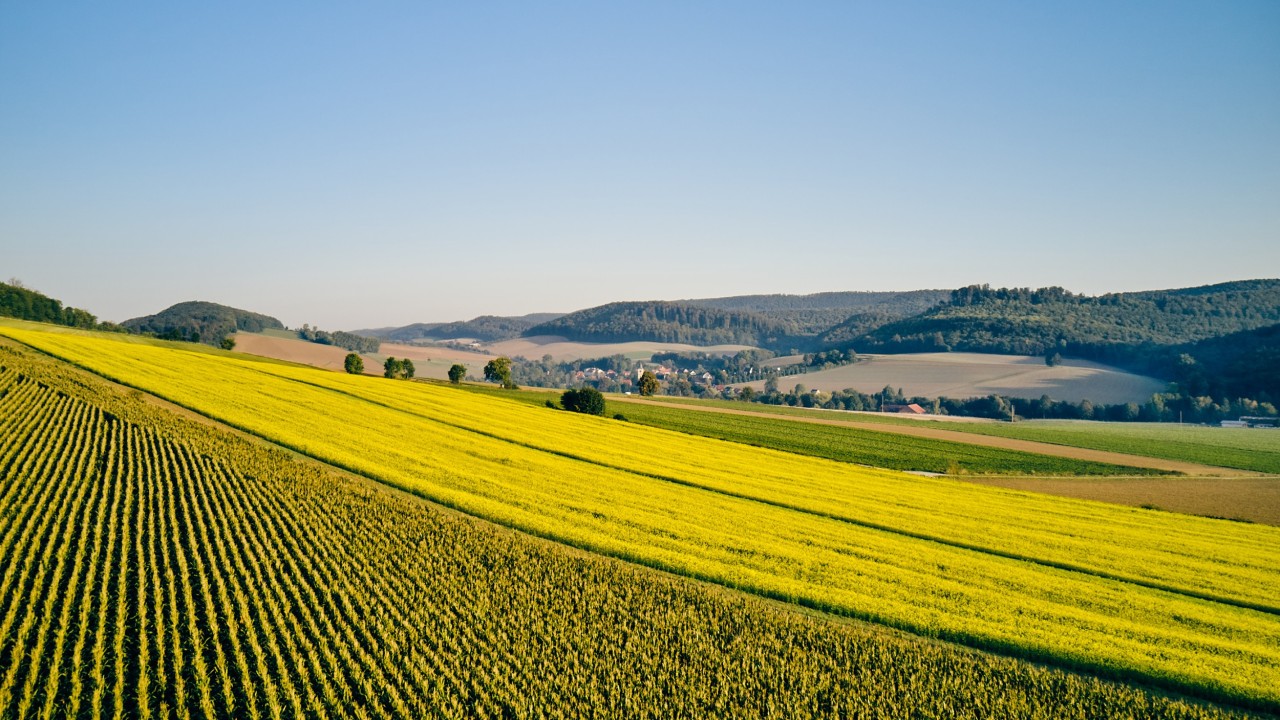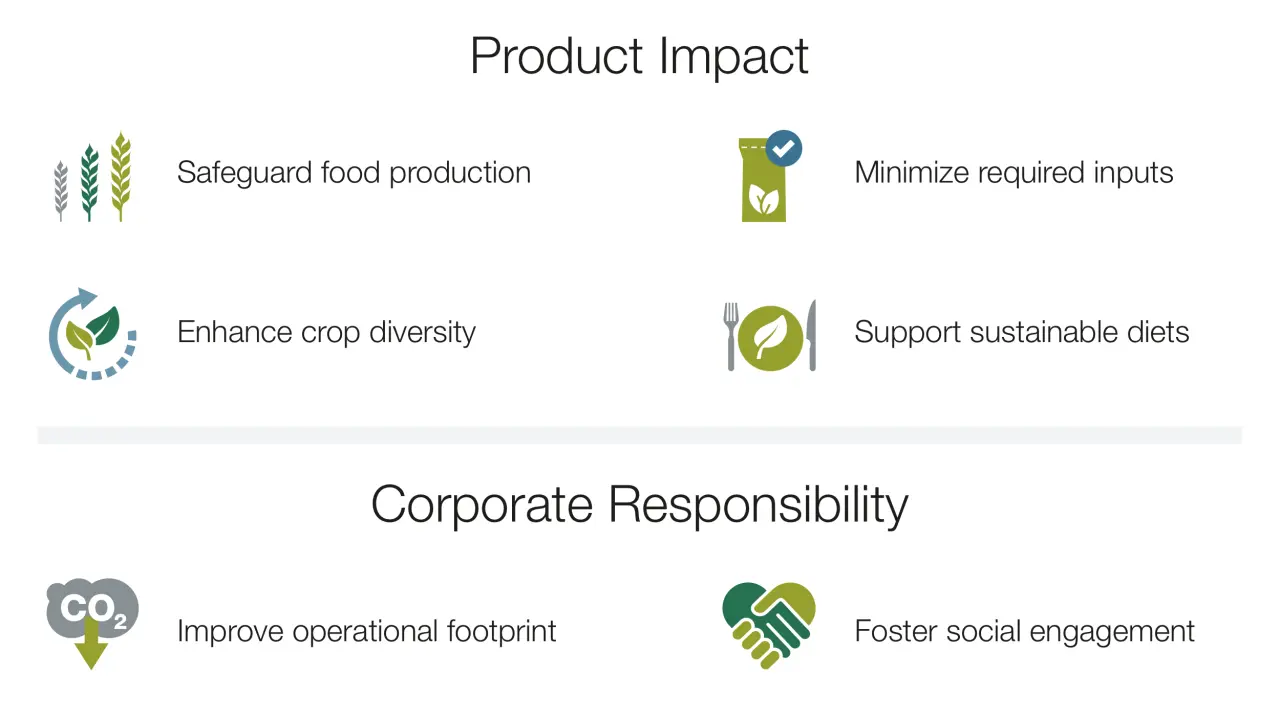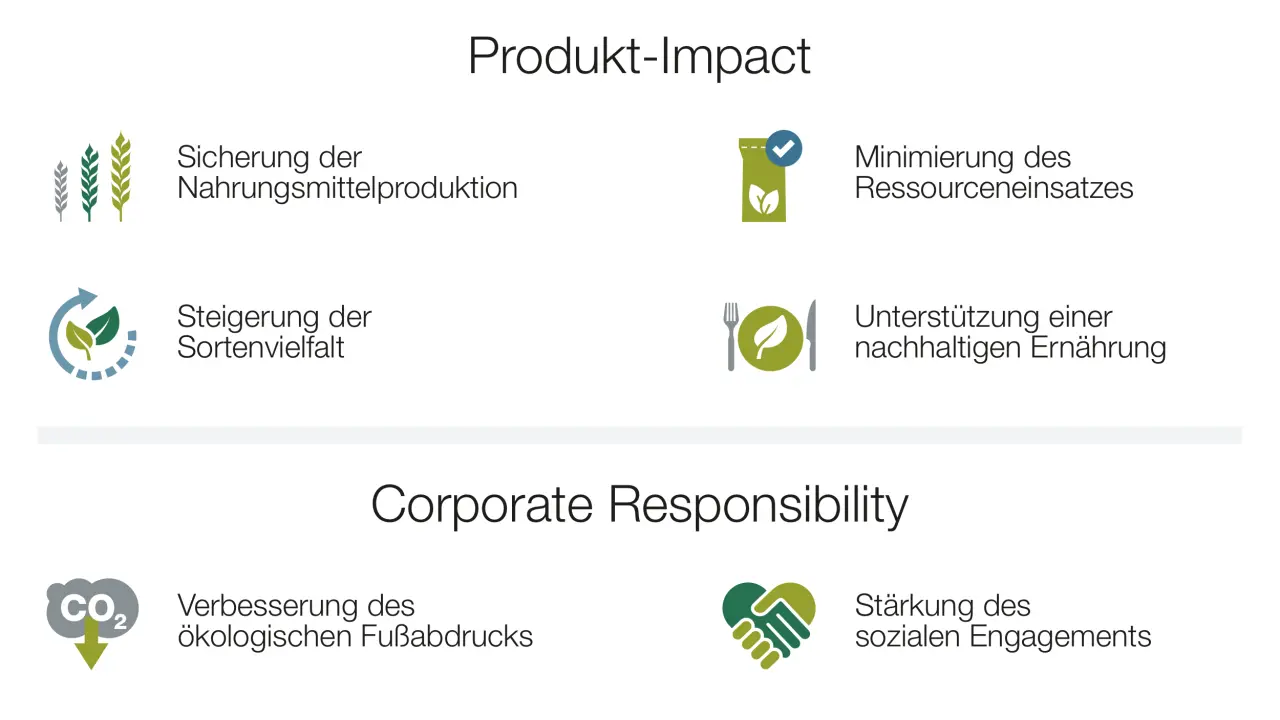Einbeck, Germany
September 20, 2021
Plant breeding as a key technology for sustainable farming into the future: In its “2030 Sustainability Ambition,” the plant breeding company KWS has set ambitious, measurable targets for itself that address economic, ecological and social components of sustainability. The ambition focuses on such issues as securing food production, limiting the use of resources, increasing the diversity of crops and varieties, and supporting sustainable nutrition. The company will also improve its own ecological footprint.

The agricultural sector faces enormous challenges: It needs to produce enough food to feed a world population that, according to UN estimates, will have grown to 10 billion people by 2050. At the same time, the industry has to address climate change, protect biodiversity and reduce the use of pesticides and other agricultural resources. Innovative plant breeding can and will play a key role in successfully and sustainably meeting these challenges.
“We want to be a reliable partner for farmers and the entire agricultural value chain in the future as well,” says Spokesperson of the KWS Executive Board Dr. Hagen Duenbostel. “Our 2030 Sustainability Ambition helps us translate the demands placed on the agriculture industry to create a concrete roadmap for our company to deliver solutions as a seed specialist to support economically viable, ecologically durable and socially responsible farming.” Duenbostel also says: “New and adapted varieties contribute to reducing the use of pesticides, fertilizers and other farming resources while also achieving high, stable yields. In addition, KWS’s diverse and thriving portfolio makes an important contribution to supporting balanced crop rotation and biodiversity in crop production as well as to achieving a balanced, varied diet.”
“Our work has always focused on sustainability, but we have now taken the next step and defined a clear ambition with measurable targets that we want to achieve by 2030,” explains KWS Corporate Responsibility Manager Marcel Agena. “These targets define our future path and help us to reach the milestones along the way.”
As part of its Sustainability Ambition, KWS has formulated six core targets in the areas of “product impact” and “corporate responsibility.”
 KWS Sustainability Ambition 2030: Overview of the targets
KWS Sustainability Ambition 2030: Overview of the targets
Sustainability targets for 2030 from the category “product impact”:
1) Realize an annual 1.5% increase in yield by
- Making progress in plant breeding
- Providing digital solutions to farmers on more than 6 million hectares of agricultural land
2) Limit the use of resources in agriculture by
- Investing more than 30% of the annual KWS research and development budget into reducing the use of resources
- Ensuring more than 25% of KWS varieties are suitable for low input agriculture
3) Enhance crop diversity by increasing the number of crops with targeted breeding programs from 24 to 27
4) Support a more sustainable diet by expanding KWS varieties suitable for direct human consumption to more than 40%
Sustainability targets for 2030 from the category “corporate responsibility”:
1) Improve the company’s operational footprint by
- Reducing scope 1 and scope 2 CO2 emissions by 50% by 2030; achieving a net-zero target by 2050
- Establish score cards to provide transparency on ecological footprint of all seed production sites
2) Foster the company’s social commitment by
- Investing at least 1% of annual EBIT (operating income) into global social projects
- Measuring and steadily increasing employee engagement
- Continuously declining the ration of occupational accidents/illness index
KWS will report on its progress in achieving these targets starting in 2022 with the publication of its annual sustainability report. You can find more information about the sustainability targets for 2030 and KWS’s approach to sustainability at www.kws.com/sustainability
Nachhaltigkeit beginnt beim Saatgut – KWS veröffentlicht Nachhaltigkeitsziele für 2030
Pflanzenzüchtung als Schlüsseltechnologie für eine zukunftsfähige Landwirtschaft: Mit der ‚Nachhaltigkeitsinitiative 2030‘ setzt sich das Pflanzenzüchtungsunternehmen KWS ambitionierte und messbare Ziele auf ökonomischer, ökologischer und sozialer Ebene. Themen wie die Sicherung der Nahrungsmittelproduktion, die Minimierung des landwirtschaftlichen Ressourceneinsatzes, die Steigerung der Kulturarten- und Sortenvielfalt und die Unterstützung einer nachhaltigen Ernährung stehen im Mittelpunkt. Auch den eigenen ökologischen Fußabdruck wird das Unternehmen verbessern.
Der Agrarsektor steht vor enormen Herausforderungen: Er muss ausreichend Nahrungsmittel für eine Weltbevölkerung produzieren, die laut Schätzung der UN bis 2050 auf 10 Milliarden Menschen angewachsen sein wird. Parallel dazu muss die Branche sich dem Klimawandel stellen, die biologische Vielfalt schützen und den Einsatz von Pflanzenschutzmitteln und anderen landwirtschaftlichen Ressourcen senken. Innovative Pflanzenzüchtung kann und wird eine Schlüsselrolle bei der erfolgreichen und nachhaltigen Bewältigung dieser Herausforderungen spielen.
„Wir wollen auch in Zukunft ein verlässlicher Partner für Landwirte und die gesamte landwirtschaftliche Wertschöpfungskette sein: Mit der Nachhaltigkeitsinitiative 2030 übersetzen wir die Anforderungen an den Agrarsektor in einen konkreten Fahrplan für unser Unternehmen, um als Saatgutspezialist Lösungen für eine wirtschaftlich rentable, ökologisch nachhaltige und sozial verantwortungsvolle Landwirtschaft zu liefern“, erläutert KWS Vorstandssprecher Dr. Hagen Duenbostel. „Neue und angepasste Sorten tragen dazu bei, den Einsatz von chemischen Pflanzenschutzmitteln, Düngemitteln und anderen landwirtschaftlichen Ressourcen zu reduzieren und gleichzeitig hohe und stabile Erträge zu erzielen. Zusätzlich leistet KWS mit einem breiten und wachsenden Portfolio einen wichtigen Beitrag zu ausgewogenen Fruchtfolgen und Biodiversität im Pflanzenbau und für eine nachhaltige und vielfältige Ernährung.“
„Nachhaltigkeit stand schon immer im Fokus unserer Arbeit – dennoch haben wir nun den nächsten Schritt vollzogen und einen konkreten Fahrplan mit messbaren Zielsetzungen definiert, die wir bis 2030 erreichen wollen. Diese Ziele stecken unseren weiteren Weg ab und helfen uns, die Meilensteine entlang dieses Weges zu erreichen“, erklärt KWS Corporate Responsibility Manager Marcel Agena.
Im Rahmen der Nachhaltigkeitsinitiative formuliert KWS sechs Kernziele in den Bereichen „Product-Impact“ und „Corporate Responsibility“:
 Überblick über die Ziele der KWS Nachhaltigkeitsinitiative 2030
Überblick über die Ziele der KWS Nachhaltigkeitsinitiative 2030
Nachhaltigkeitsziele 2030 aus der Kategorie „Product-Impact“:
1) Erzielung einer jährlichen landwirtschaftlichen Ertragssteigerung um 1,5 % durch
- Fortschritte in der Pflanzenzüchtung
- Einsatz von digitalen Lösungen auf >6 Millionen Hektar landwirtschaftlicher Nutzfläche
2) Minimierung des Ressourceneinsatzes in der Landwirtschaft durch
- Investition von >30 % des jährlichen KWS Forschungs- und Entwicklungsbudgets in die Reduzierung des Ressourceneinsatzes
- Eignung von >25 % der KWS Sorten für den Anbau unter geringem Ressourceneinsatz
3) Steigerung der Kulturartenvielfalt durch Erhöhung der Anzahl an Kulturarten mit gezielten Züchtungsprogrammen von 24 auf 27
4) Unterstützung einer nachhaltigeren Ernährung durch Steigerung der KWS Sorten zur direkten Verwendung in der menschlichen Ernährung auf >40 %
Nachhaltigkeitsziele 2030 aus der Kategorie „Corporate Responsibility“:
1) Verbesserung des eigenen ökologischen Fußabdrucks durch
- Reduktion der Scope-1 und Scope-2 CO2 Emissionen bis 2030 um 50 %; Realisierung des Netto-Null-Ziels bis 2050
- Einführung von Score Cards zur transparenten Dokumentation des ökologischen Fußabdrucks aller Produktionsstandorte
2) Stärkung des sozialen Engagements durch
- Investition von mindestens 1 % des jährlichen EBIT (Betriebsergebnis) in weltweite Sozialprojekte
- Messung und fortlaufende Erhöhung der Mitarbeiterbindung
- Kontinuierliche Senkung der Zahl der Arbeitsunfälle und der Krankheitsrate
Im Rahmen des jährlich erscheinenden Nachhaltigkeitsberichts wird KWS ab 2022 über die Fortschritte bei der Erreichung der Ziele berichten. Weitere Informationen zu den Nachhaltigkeitszielen 2030 und den Nachhaltigkeitsansatz der KWS finden Sie unter www.kws.de/nachhaltigkeit